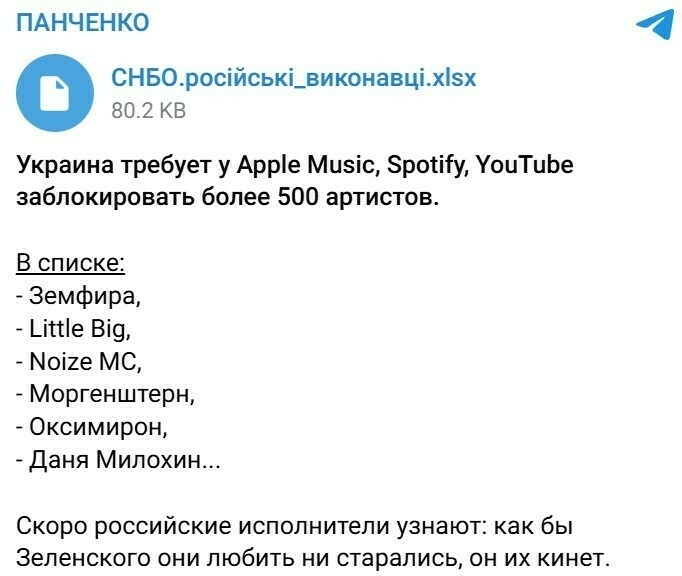Verification within Meta’s Third-Party Fact-Checking Program
Pro-Russian blogger Diana Panchenko spread information claiming that the National Security and Defense Council of Ukraine (NSDC) demands that Apple Music, Spotify, and YouTube block 500 Russian artists. In her post, she attached an alleged NSDC list of these musicians.
However, this is fake. The NSDC does not have the authority to compel international platforms to block specific artists. The body did not make such a request to streaming platforms, and the list of artists is fabricated.
Screenshot of the post
Diana Panchenko is a former host of the propaganda channel NewsOne and a regular speaker and author for the publication GOLOS.EU, which is banned in Ukraine. In 2023, the Security Service of Ukraine charged her with treason for engaging in subversive activities against Ukraine, justifying Russia’s armed aggression, and supporting the occupation of Ukraine. After February 24, 2022, Panchenko left for temporarily occupied Donetsk, where she continues to spread pro-Russian narratives and accuses the Ukrainian government of starting the war.
It is unclear where Panchenko obtained the list of artists that the NSDC allegedly demanded be blocked. This list is not available on the NSDC website, nor is there any information about an appeal to Apple Music, Spotify, or YouTube. The document title — “SNBO. Russian artists” — is likely a sign of forgery, as “SNBO” is the Russian abbreviation of the body’s name. Furthermore, no Ukrainian media outlet has reported on this.
The NSDC does indeed have the authority to impose sanctions on other states or on foreign individuals, companies, and their affiliates. However, the body cannot interfere with the operation of international platforms or demand the blocking of certain artists on those platforms. International digital platforms operate under the laws of the countries in which they are registered and primarily conduct business. Spotify is registered in Luxembourg, while YouTube Music and Apple Music are based in the United States.
Previously, the issue of Russian artists’ presence on international streaming services was raised in Ukraine. For example, in February 2023, Head of the Presidential Office Andrii Yermak told The Sunday Times that he had approached Spotify with a request to remove from its catalog Russian artists who support the Kremlin’s policies. In June 2024, the platform removed the pages and music of several Russian performers sanctioned by the EU and the US.
Also, in February 2025, activist Oleksandr Leonenko submitted a petition proposing the blocking of Russian-language songs on streaming platforms in Ukraine. In response to this initiative, the government stated: “International law, Ukrainian legislation, and the broadcasting rules of foreign platforms do not contain legal grounds for banning or otherwise restricting musical products based on language.”
Meanwhile, MP Yaroslav Yurchyshyn explained that Ukraine can block content not on a linguistic basis, but if an artist supports the Russian aggressive policy. “If we have clear arguments that this is propaganda of the ‘Russian world,’ an ideology recognized as illegal in Ukraine and which led to aggression against us, then it is quite possible,” he stated. However, at the time of writing, there have been no cases where international streaming services blocked Russian artists at Ukraine’s request.
